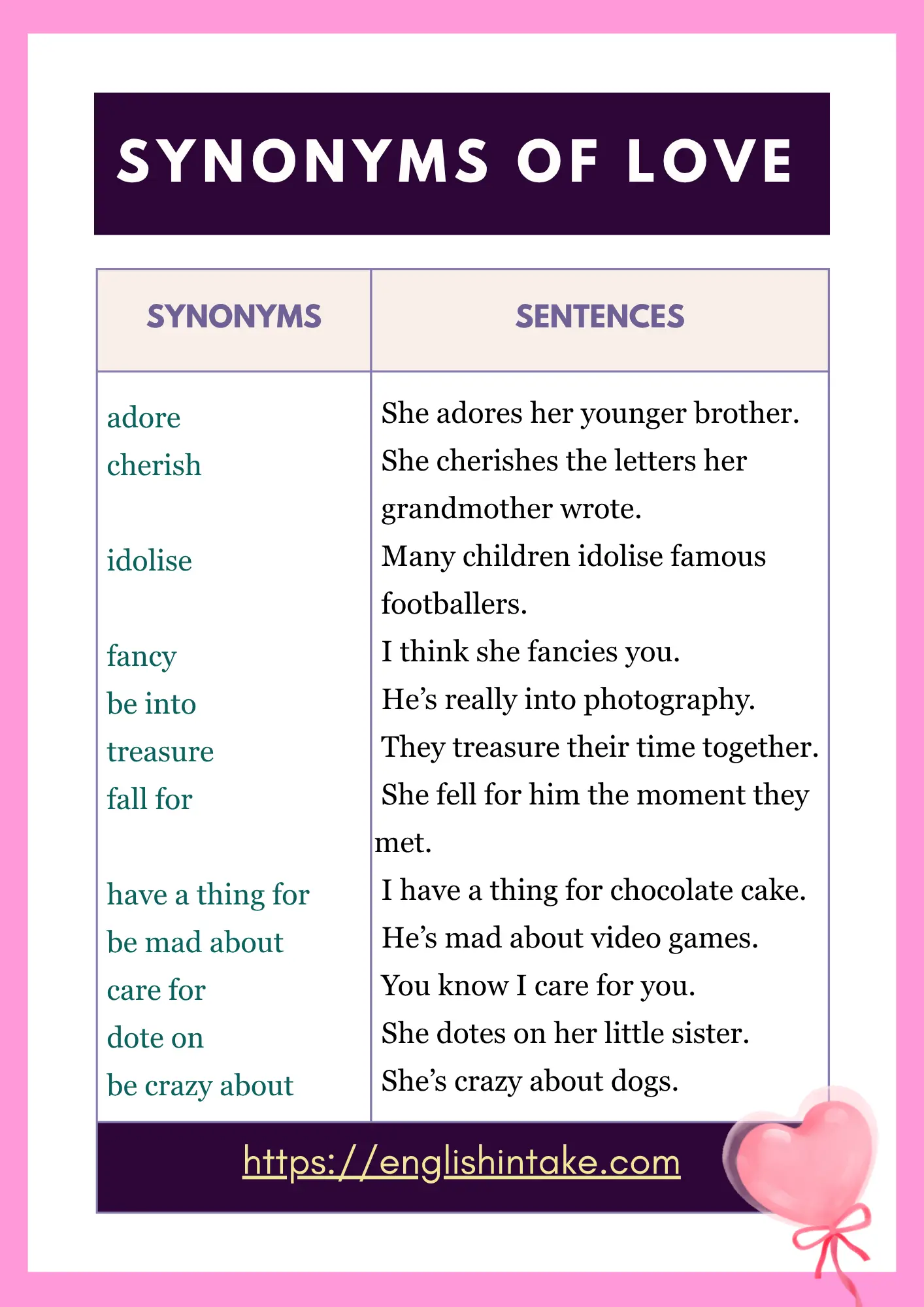In this lesson, you’ll learn over 50 synonyms for love, their meanings, and how to use them in sentences to help you enrich your emotional expressions. Love is a positive emotion that connects us to the people we cherish. Different types of love (romantic, platonic, familial) require different words.
Knowing the right word for the right situation helps you express your emotions clearly and connect better with others.
Here’s a comprehensive list of over 50 synonyms for love, grouped by intensity and context:

1. Romantic love
Romantic love is a deep emotional or physical connection between two people characterised by passion, intimacy, and commitment. It goes beyond friendship or familial love and typically involves feelings of attraction, desire, and a strong bond that makes the relationship unique. Romantic love can be associated with relationships between partners or spouses.
Adore: to love deeply and passionately. I adore you.
Cherish: to hold dear and care for deeply. I cherish every moment we spend together.
Idolise: to love or admire someone excessively. She idolises her favourite actor.
Worship: to show intense love and admiration. He worships the ground she walks on.
Infatuation: intense but short-lived passion. Their relationship started with infatuation.
Passion: strong and intense emotion. Their passion for each other was undeniable.
Desire: a strong feeling of wanting someone. He felt an overwhelming desire to be near her.
Yearning: a deep longing for someone. She felt a yearning for his presence.
Fascination: intense interest and attraction. He had a fascination for her intelligence.
Enchantment: a feeling of being captivated. She was under his enchantment.
2. Platonic love
Platonic love is a deep, non-romantic affection and connection between two people, characterised by emotional intimacy, mutual respect, and genuine care without any physical or sexual attraction. It is can be found in close friendships where individuals share their thoughts, feelings, and experiences openly, offering support, understanding, and loyalty.
Unlike romantic love, platonic love focuses on the bond of companionship and trust, creating a meaningful relationship that enriches lives without the complexities of romance. Examples include best friends, mentors, or even family members who share a strong, loving connection based on shared values and emotional closeness.
Affection: a gentle feeling of fondness. She has great affection for her friends.
Fondness: a liking or tenderness toward someone. He has a fondness for his childhood friends.
Compassion: deep sympathy and care for others. Her compassion for animals is inspiring.
Devotion: loyalty and deep commitment. His devotion to his family is unwavering.
Attachment: a strong emotional bond. The child has a strong attachment to her teddy bear.
Friendship: a close and trusting relationship. Their friendship has lasted for decades.
Loyalty: faithfulness and support. Her loyalty to her friends is admirable.
Kindness: being friendly and considerate. His kindness made everyone feel welcome.
Empathy: understanding and sharing others’ feelings. Her empathy made her a great listener.
Respect: admiration for someone’s qualities. He has great respect for his mentor.
3. Familial love
Familial love is the deep, enduring bond shared between family members, characterised by unconditional care, loyalty, and a sense of belonging. It is the affection and connection felt between parents and children, siblings, and extended family, usually rooted in shared experiences, traditions, and a sense of duty.
Unlike romantic or platonic love, familial love is typically innate and long-lasting, providing a foundation of support, security, and emotional warmth throughout life. Examples include a parent's nurturing care for their child, the protective bond between siblings, or the respect and gratitude shown towards grandparents. This type of love is often expressed through acts of kindness, sacrifice, and a lifelong commitment to one another.
Bond: a close connection. The bond between siblings is unbreakable.
Closeness: a feeling of being emotionally connected. Their closeness as a family is heartwarming.
Kinship: a sense of belonging to the same family. They share a deep kinship despite living far apart.
Nurture: to care for and encourage growth. Parents nurture their children with love.
Protectiveness: a desire to keep someone safe. Her protectiveness toward her younger brother is admirable.
Warmth: a feeling of affection and care. The warmth of her hug was comforting.
Support: providing help and encouragement. Her family’s support gave her strength.
Unity: a sense of togetherness. Their family’s unity was their greatest strength.
Care: concern and attention. She showed great care for her ageing parents.
Duty: a sense of responsibility. He felt a duty to protect his family.
4. Self-love
Self-love is the practice of valuing, accepting, and caring for oneself unconditionally, recognising one's own worth and prioritising personal well-being. It involves treating oneself with kindness, compassion, and respect, much like how one would treat a loved one.
Self-love includes setting healthy boundaries, practising self-care, and nurturing a positive relationship with oneself, free from excessive self-criticism or comparison to others. It is essential for mental and emotional health, fostering confidence, resilience, and a sense of inner peace.
Examples of self-love include taking time to rest, pursuing personal growth, and speaking to oneself with encouragement and understanding. Ultimately, self-love is the foundation for leading a balanced, fulfilling life and building healthier relationships with others.
Self-respect: pride and confidence in oneself. Self-respect is the foundation of a happy life.
Self-care: taking care of one’s own well-being. Practising self-care is an act of self-love.
Self-acceptance: embracing oneself fully. Self-acceptance is key to inner peace.
Self-worth: recognizing one’s own value. Never let anyone diminish your self-worth.
Self-compassion: being kind to oneself. Self-compassion helps you recover from setbacks.
Confidence: belief in one’s abilities. Her confidence inspired everyone around her.
Self-esteem: a sense of self-worth. Building self-esteem is crucial for mental health.
Self-awareness: understanding one’s own emotions. Self-awareness is the first step to self-love.
Self-kindness: treating oneself with gentleness. Self-kindness is essential for healing.
Self-empowerment: taking control of one’s life. Self-empowerment leads to personal growth.
5. Universal love
Universal love is an all-encompassing, unconditional affection and compassion that extends beyond personal relationships to embrace all living beings and the world at large. It is characterised by a deep sense of empathy, kindness, and a desire to contribute positively to the well-being of others, regardless of differences in background, culture, or beliefs.
Universal love transcends boundaries, fostering a sense of unity and interconnectedness among humanity and the natural world. It can be expressed through acts of altruism, charity, and a commitment to justice, peace, and environmental stewardship. Examples include volunteering for a cause, showing kindness to strangers, or advocating for global harmony. Universal love reflects the highest form of love, promoting a world rooted in compassion, understanding, and shared humanity.
Empathy: understanding and sharing others’ feelings. Empathy is the foundation of universal love.
Altruism: selfless concern for others. His altruism inspires everyone around him.
Humanity: compassion for all people. Acts of kindness restore our faith in humanity.
Kindness: being friendly and considerate. Kindness is a universal language of love.
Generosity: willingness to give and share. Her generosity knows no bounds.
Compassion: deep sympathy and care. Compassion connects us all.
Charity: helping those in need. Charity is an expression of universal love.
Forgiveness: letting go of resentment. Forgiveness is an act of love.
Harmony: peaceful coexistence. Harmony among people is a form of love.
Unity: a sense of togetherness. Unity is the essence of universal love.
6. How to use love synonyms in everyday conversations?
Here are some examples of how to use these synonyms in everyday conversations and writing:
- I adore the way you make me laugh.
- Her compassion for others is truly inspiring.
- The bond between a mother and child is unbreakable.
